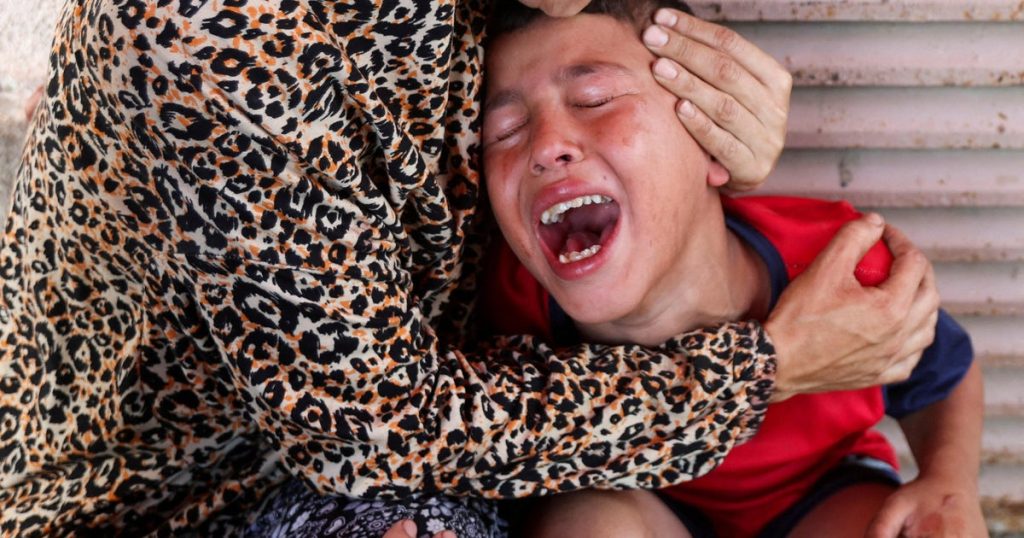Amid ongoing conflict in Gaza, discussions for a ceasefire between Israeli Prime Minister Benjamin Netanyahu and U.S. President have faltered, with negotiations in Qatar yielding no results. Intense military operations continue, leading to significant civilian casualties, including a harrowing incident resulting in the deaths of 15 people, many of whom were children. As the situation worsens, humanitarian voices are increasingly condemning the violence and calling for urgent international action.
| Article Subheadings |
|---|
| 1) Negotiations Stalled for Ceasefire |
| 2) Ongoing Military Operations in Gaza |
| 3) Civilians Caught in the Crossfire |
| 4) Humanitarian Concerns Intensify |
| 5) Global Responses and Future Implications |
Negotiations Stalled for Ceasefire
Negotiations between Israeli leaders and U.S. officials have not yielded the desired ceasefire agreement as tensions linger in the region. After five days of talks in Qatar, alongside two meetings in Washington, D.C., Prime Minister Benjamin Netanyahu ended discussions without securing a truce. Optimism earlier voiced by the Trump administration indicated a potential resolution might be reached quickly; however, a senior Israeli official indicated that it could take up to 20 days for an agreement to materialize. This uncertainty heightens concerns about the ongoing violence, which has escalated with each passing day.
Ongoing Military Operations in Gaza
The Israeli military continues its extensive operations across Gaza, focusing on dismantling the infrastructure of Hamas, the militant group that governs the territory. With international journalists barred from entering Gaza, reports from the border indicate massive explosions that cloud the sky. Recent military strikes have resulted in multiple attacks across the region, with hospital workers reporting that at least 55 Palestinians have lost their lives in just 24 hours. The Israeli Defense Forces (IDF) mention that operations target specific individuals associated with terrorist activities, yet the collateral damage has triggered sharp criticisms from various humanitarian groups.
Civilians Caught in the Crossfire
Among the most devastating recent events was an airstrike in Deir al-Balah, where 15 civilians, primarily women and children, were killed while awaiting vital health services at a local clinic. This tragic incident occurred outside a health clinic run by the U.S.-based charity Project HOPE as people gathered for nutritional supplements. The attack has drawn immediate condemnation as it underscores the dire realities facing civilians in the war zone. Project HOPE’s president Rabih Torbay stated that the clinic serves as a refuge for families in need, making the strike a grievous violation of humanitarian standards. Furthermore, eyewitness accounts paint a shocking picture of the moment when the missile struck, highlighting the vulnerability of innocent lives amidst armed conflict.
Humanitarian Concerns Intensify
In the wake of increasing civilian casualties, humanitarian responses have gained urgency. Critics argue that the current state of warfare represents a clear violation of international humanitarian laws, especially concerning the rights and protection of children in conflict zones. Dr. Mithqal Abutaha, Project HOPE’s project manager, lamented the tragedy and the vulnerability of those waiting for essentials. Public outcry is mounting as humanitarian organizations call for an immediate ceasefire to prevent further loss of innocent lives and to allow for the provision of much-needed aid to those affected by the ongoing strife.
Global Responses and Future Implications
The global community is watching the situation with increasing alarm. Various governments and international organizations are voicing their concerns regarding the humanitarian crisis unfolding in Gaza. The lack of actionable agreements following prolonged negotiations raises questions about the effectiveness of diplomatic efforts in resolving the crisis. Furthermore, as the death toll among Israeli soldiers also rises—18 military personnel lost over the past three weeks, the pressure on Prime Minister Netanyahu to establish a ceasefire is growing. Continued military operations are likely to provoke further violence and deepen divisions, not only in the region but on a wider international scale.
| No. | Key Points |
|---|---|
| 1 | Ongoing ceasefire negotiations between Israel and the U.S. have stalled with no resolution in sight. |
| 2 | Intense military operations are continuing in Gaza, focusing on Hamas targets. |
| 3 | Recent airstrikes have resulted in significant civilian casualties, including many children. |
| 4 | Humanitarian organizations are condemning the violence and calling for immediate action. |
| 5 | Global reactions are critical, emphasizing the need for diplomatic solutions to prevent further escalation. |
Summary
The ongoing conflict in Gaza highlights a critical humanitarian crisis exacerbated by stalled negotiations for a ceasefire between Israeli and U.S. officials. As military operations escalate and civilian casualties mount, urgent calls for international action resonate louder. The international community’s response will be pivotal in shaping the future dynamics of peace and security in the region, as lives continue to hang in the balance amid war.
Frequently Asked Questions
Question: What are the key issues in the ongoing conflict in Gaza?
The conflict primarily revolves around military operations targeting Hamas, with significant civilian casualties and humanitarian concerns at the forefront. The failure to achieve a ceasefire exacerbates tensions both locally and internationally.
Question: Why are humanitarian organizations speaking out against military actions?
Humanitarian organizations condemn military actions due to the lethal impact on non-combatants, including women and children. They advocate for the protection of civilians and adherence to international humanitarian laws.
Question: What role is the U.S. playing in the negotiations?
The U.S. has been involved in mediation efforts between Israel and Hamas, aiming to broker a ceasefire and restore peace. However, ongoing violence complicates these efforts, showcasing the challenges in achieving diplomatic solutions.


